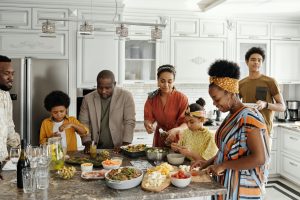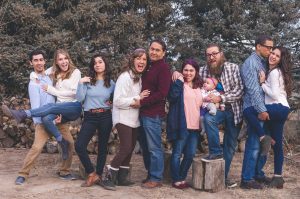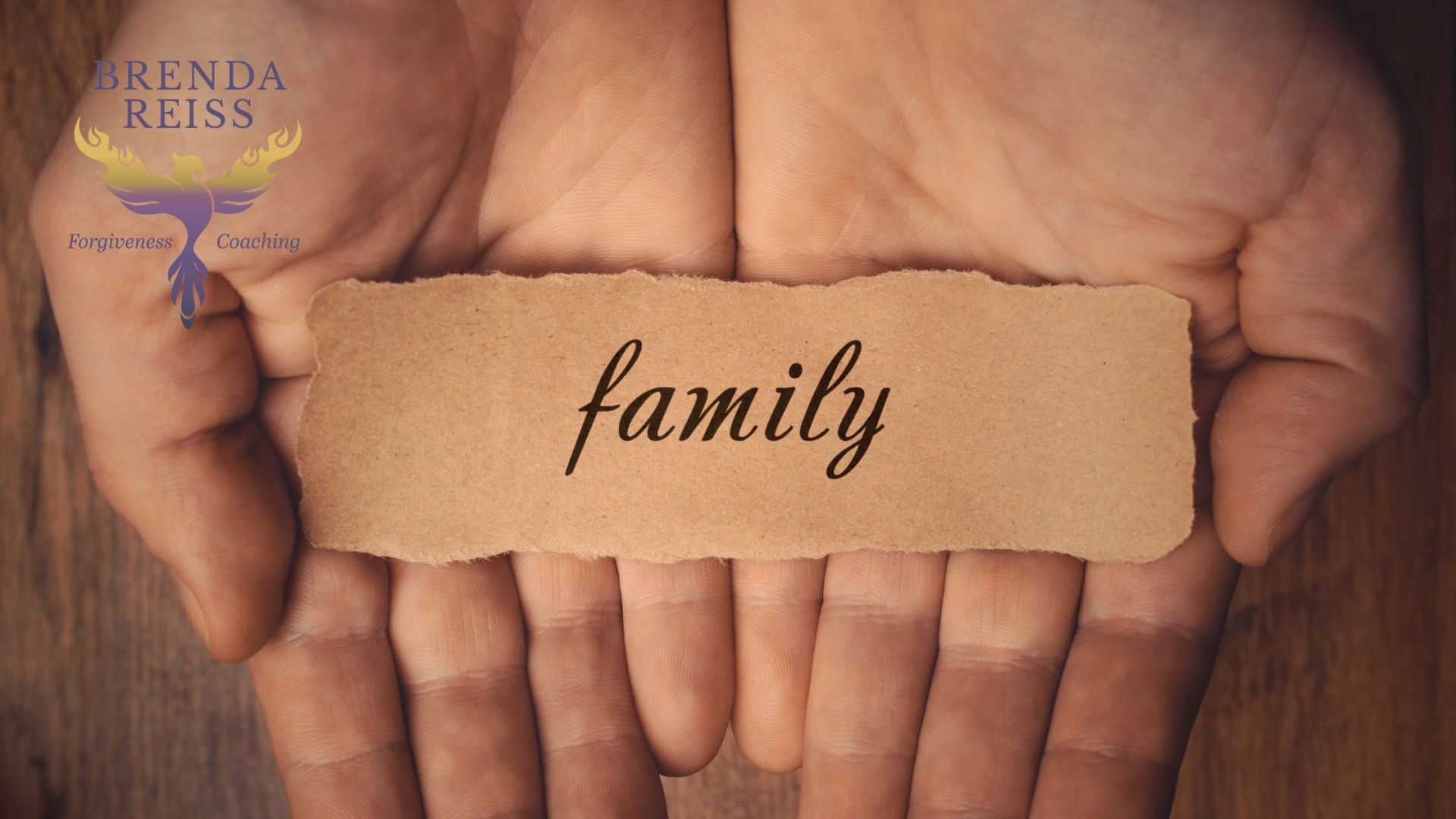Ahh..the holidays. They always bring about some feelings about our family dynamics and the roles we play within our relationships. It’s unavoidable, as more families gather at this time of year, but it doesn’t have to cause stress when you’re thinking about the interactions. Learning about family dynamics during the holidays can benefit your relationships all year.
What Are Family Dynamics?
There are lots of ideas that come to mind when we talk about family dynamics as a concept. At the core, we just believe them to be how our families click–how the people in our families  roll, so to speak, and how that affects us.
roll, so to speak, and how that affects us.
To some degree, that’s a pretty bare-boned definition of family dynamics, but as a life coach, particularly one focusing on forgiveness, there’s more to the story. The roles we (and others)
play in families make a big difference, especially during the holidays that are already full of hustle and bustle and intense feelings.
Family dynamics are the patterns of interactions between relatives. The roles and relationships they take on, as well as other factors, shape those interactions and can have positive and negative feelings associated. Our family dynamics shape how we learn to relate to each other and the world. This can be done in healthy ways with boundaries that allow people to be the best they can be in their roles. Still, it can also be dysfunctional, leading to dysfunctional interactions as adults.
The best news is that we don’t have to stay stuck in the patterns and roles of the family dynamics we are born (or brought) into. When we are aware of our family dynamics and the roles we and those we love have, we can make changes for ourselves, leading to different interactions with others.
What factors influence family dynamics?
Several factors influence family dynamics. While it’s more evident that traumatic things like death, divorce, grief, or other wounding episodes can change family dynamics, sometimes more subtle things do as well. Things like our culture or ethnicity can play a role, and often we feel those are things that just can’t change since they are a part of who we are.
Interactions with those who have disabilities or chronic illnesses (or when we struggle with those conditions ourselves) can change family roles and dynamics too. For instance, if you grow up with a parent with a chronic illness, you may likely take on more of a parental role yourself, and co-dependency may be how you learn to function with them and others.
Substance abuse or being in abusive relationships (or even having controlling parents or other family members) frame roles in family situations, and mental health conditions that affect family members also have their tolls.
What types of roles in family dynamics do we see?
We see six typical dynamics in the roles people play in relationships.
Authoritarian-Authoritarian family dynamics demand rule-following with no exceptions. These dynamics typically have one (maybe two) controlling people who insist on exactly what they want, and there is no room to question. Additionally, there is often punishment when what an authoritarian wants to have happen doesn’t, so ‘obedience’ in these situations is often done out of fear and not necessarily respect or love for the person.
Authoritative-Authoritative family dynamics look similar to authoritarians; however, they tend to be where compliance to what they want is directed with more positive rewards and discipline. There are more praise and reward systems to get rules to be followed, and while punishment isn’t necessarily used, there is often compliance to the rules out of ‘guilt’ or wanting to please rather than intrinsic motivation.
Competitive- A competitive family dynamic is one in which family members feel they have to compete with one another. Parents try to outdo each other as the better parent; siblings try to outshine their siblings for more recognition, power, or attention. There’s often a feeling of inadequacy and the constant necessity to function at a high level when competitive dynamics are happening. Even in romantic relationships, partners can compete with each other over success in their careers or other arenas.
Uninvolved- Uninvolved family dynamics means that family members typically don’t show up for one another. Even if they’re in the same room for a family dinner, they don’t seem to be present in the moment or take a genuine interest in the lives of the others in the family. This can lead to feeling like there is no guidance or support in their family system.
Communal- Communal family dynamics are those where the family feels like a community. Members feel as if they are contributors to the group.. Where communal family dynamics exist, members feel heard and respected. Rules are more flexible because rulemaking is shared and looked at for the good of the whole group.. Participation in all that goes on is encouraged. This sounds like the most supportive family dynamic; for the most part, it’s healthy. That said, some family members feel the pressure of participation to be heavy.
Alliance– Alliance-based family dynamic roles are just as they sound–where family members will pick and choose those with whom they’ll form ‘alliances’ to gain leverage or control over other members. These may look as if there are cohesive bonds within the dynamic, but they also lead to feelings of jealousy and rivalry.
What roles do we play in family dynamics?
According to innerchange.com, there are six archetypal roles that people play in their family dynamic scenarios.
They include: The Hero, Rescuer, Scapegoat or black sheep, Clown, Lost Child, and Nurturer.
The hero is typically the high-achieving family member who overcompensates so they can mask feelings of inadequacy. They’re often thought of as ‘the good child’ or the ‘responsible one,’, and they’re usually good leaders who are goal-oriented and self-disciplined. They generally find relaxing, playing, or taking time for themselves difficult. They also have a hard time following others or letting others be right.
The rescuer is a natural caregiver who takes care of the needs of others. They always want to smooth things over, and have difficulty with conflict. They’re really rescuing others to meet 
The scapegoat (or black sheep) of the family is the one family members collectively feel needs the most help. They generally could be the one who comes off as very affable with a good sense of humor and transparency about their feelings. That said, they often have inappropriate expressions of their feelings and may have some issues with social or emotional situations.
The family clown will try to use humor to de-escalate family conflict and pretend everything around them is okay. They can lighten the moment, but that also means they often hide their own true feelings of fear and anxiety.
The lost child isn’t really lost but is the typical subservient ‘good kid’. They are passive, obedient, and often hidden when family trauma is displayed. They try to lay low on the radar to avoid adding additional problems and are often thought to be the most easygoing and flexible. That leads them to have difficulty making decisions or having any sense of their own direction,
The nurturer is the one who gives emotional support, creates safe boundaries and places for family members to exist, and often acts as a mediator in situations. Similar to rescuers, they want to take care of others because they want emotional situations to be balanced.
When you understand different family dynamics and roles within those dynamics, you can learn a lot about yourself. Looking at how you grew up and how you functioned can help you see the roles you play in your adult relationships, your work, and the world around you.
How do I use this information to better my relationships?
The key to understanding how family roles impact us is being self-aware. When we realize that a controlling boss reminds us of our mother or father or that a competitive sister-in-law reminds us of our own competitive sibling, we can see how the triggers can move us to behave in ways we may have as children.
Being aware of our family dynamics and roles allows us to change and GROW! The best way to do that is to look at creating boundaries in our lives.
When we set boundaries, we do something we didn’t have the chance to do when we were younger. We most likely didn’t benefit from boundaries being modeled either, so being self-aware is the gift we need to create boundaries that allow us to grow healthily.
When you set boundaries, don’t feel bad about it. Boundaries are good for us and help us feel safe and protected. If you’re concerned about hurting feelings, consider writing out some things that will help you remember how to take care of yourself!
These may include things like:
- I have the right to feel safe.
- I have the right to ask for my needs to be met.
- I have the right to question dictated demands.
- I have the right to tell someone when they’re inappropriate with me.
- I have the right not to feel like I have to prove myself.
To do this, you may want to look at your own Core Values. Find three or four core values that encompass who you are and what’s important to you right now. These may include respect, 
Then, ask questions that help you create boundaries to protect those values. Ask yourself what you’ll allow in your life that will affect your health. Ask what you’re willing to tolerate about respect in your life. Ask what you will NOT allow when it comes to self-care.
Most importantly, share your boundaries with others. You can do it in a kind and loving way. It can feel scary, and you may worry about rejection, but the truth is that if others can’t respect your boundaries, they may not be for you anyway.
Call your family members out when they step over your lines, but in a way that gives opportunities to grow. For instance, you can say something like, “When you joke about my new fitness schedule, I don’t feel respected. How can we work on this together?”
It may throw someone at first, but I promise, it gets the conversation started!
Forgive Yourself!
It’s no secret I love working with others to help them find their best selves. Our work on our radio show brings hope and help to so many people! I’ve also launched my new podcast, “Forgive Yourself” and would love you to tune in to see how we can continue to grow together.
In March, I’ll start a new 8-week group coaching session and would love to have you part of that amazing and healing group! For more information, just click here!




0 Comments